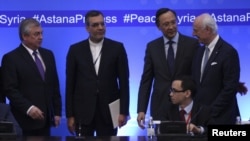Russia, Turkey, and Iran, at a conference in Astana, Kazakhstan, announced an agreement to create 'de-escalation zones' in major areas of conflict between Syrian government forces and rebel groups.
The United States was represented at the Astana conference by Acting Assistant Secretary Stuart Jones. The United States was not a direct participant in the negotiations and is not, at this point, a party to the agreement.
"The United States supports any effort that can genuinely de-escalate the violence in Syria, ensure unhindered humanitarian access, focus energies on the defeat of ISIS and other terrorists, and create the conditions for a credible political resolution of the conflict," said State Department Spokesperson Heather Nauert.
The U.S. appreciates the efforts of Turkey and the Russian Federation to pursue this agreement and has encouraged the Syrian opposition to participate actively in the discussions despite the difficult conditions on the ground.
"We continue to have concerns about the Astana agreement," said Ms. Nauert, "including the involvement of Iran as a so-called 'guarantor.' Iran’s activities in Syria have only contributed to the violence, not stopped it, and Iran’s unquestioning support for the Assad regime has perpetuated the misery of ordinary Syrians."
In light of the failures of past agreements, the U.S. has reason to be cautious. "We expect the [Syrian] regime to stop all attacks on civilians and opposition forces, something they have never done," said Spokesperson Nauert. "We expect Russia to ensure regime compliance."
The opposition must also live up to its commitments, with Turkey as the guarantor, to separate from designated terrorist groups, including al-Nusra Front, which continue to hijack the legitimate aspirations of the Syrian people for a representative and accountable government.
The U.S. nonetheless hopes that this arrangement can contribute to a de-escalation of violence, end the suffering of the Syrian people, and set the stage for a political settlement of the conflict.
The United States looks forward to continuing its dialogue with Russia on efforts to responsibly end the Syria conflict. The U.S. also continues to support the United Nations-led process in Geneva to bring about a negotiated settlement.














